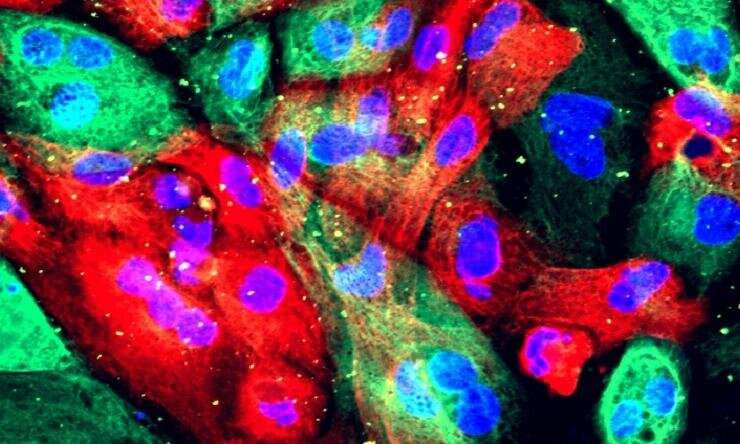by American Chemical Society

Prostate cancer cells. Credit: NIH Image Gallery
To explore why prostate cancer disproportionately sickens and kills Black men, researchers are looking to another disorder, diabetes, which alters metabolism. They used this approach in a preliminary clinical trial and today report the identification of four metabolism-related biomarkers linked to an increased risk of metastatic prostate cancer in men of West African heritage. This discovery could lead to improved testing and treatments for these patients.
The researchers will present their results at the fall meeting of the American Chemical Society (ACS).
“We have identified genetic and other molecular changes that we hope to develop to predict which Black men are at the highest risk of having their cancer spread,” says Sarah Shuck, Ph.D., the project’s principal investigator, who is presenting the work at the meeting.
“Such a test would give doctors the ability to more accurately predict patients’ prognoses and perhaps design therapies that prevent metastasis,” Shuck says. She is at City of Hope, a cancer and diabetes research organization and cancer treatment center.
One of the most common malignancies in the U.S., prostate cancer is about 60% more common in Black men than among men of all races, and Black men are twice as likely to die from it, according to statistics from the National Cancer Institute. Diabetes, a chronic condition in which the body’s cells can’t properly pull sugar from the blood, also disproportionately affects Black people and is linked with an increased risk of death for Black men with prostate cancer.
Shuck’s lab studies the metabolism changes that occur in diabetes and how they can overlap with cancer. This research has included a highly reactive compound known as methylglyoxal, a typical product of metabolism that is elevated in people with diabetes.
Inside cells, methylglyoxal attaches to DNA, RNA and proteins, interfering with their function and promoting the emergence of cancer. Researchers haven’t yet looked at this dynamic in prostate cancer, but they know that in general, when the complexes accumulate inside and outside of cells, they can drive the spread of cancer.
To find out if these factors play into the racial disparities observed with prostate cancer, the team conducted a small clinical study. Shuck’s collaborators Leanne Woods-Burnham, Ph.D., and Rick Kittles, Ph.D., of Morehouse School of Medicine, gathered blood samples from 371 men with and without prostate cancer from four sites around the U.S. To determine the participants’ race, they assessed samples for genetic evidence of West African heritage. The team, including John Termini, Ph.D., at City of Hope, then looked at four markers associated with methylglyoxal, including the complexes it forms with DNA, RNA and protein. The markers also included variation in a gene, GLO1, that encodes a protein that detoxifies these complexes.
Their analysis uncovered a surprise: Men of West African descent participating in the study had fewer of these malignancy-promoting complexes in their blood. What’s more, the lower the level of these complexes in the samples, the greater the risk of metastatic disease, contrary to expectations. The researchers speculate that in this group of men, these complexes become sequestered in tumor cells, spurring on metastatic processes from within. These findings did not apply to men of European descent.
When looking at other potential risk factors, such as body mass index and cholesterol levels, the researchers could not identify anything else that appeared to predict an increased risk of metastasis in the Black participants. In their follow-up research, they plan to continue looking for other risk-predicting variables from within a larger group of participants.
The researchers have their sights set on not only gaining a better understanding of prostate cancer disparities, but also on developing a diagnostic test. “Ultimately, we hope to build a multi-component test doctors could use to predict which Black men are at the highest risk of developing and dying from prostate cancer,” says Shuck.

Leave a Reply